#sf literature
Explore tagged Tumblr posts
Text
I'm reading Little Mushroom, which is a sci-fi danmei novel by Shisi and it didn't really register to me that this is the first book in this specific genre I'm reading. Now I'm spiralling down an intellectualising rabbit hole where I have to read up more on speculative fiction, dystopian fiction, Chinese sci-fi, worldbuilding etc. Right now I do have thoughts, but they're just raw Thoughts without any context or intellectual analysis. Some might argue you don't need those to have opinions on a book but that's just how I am.
19 notes
·
View notes
Text
Am I supposed to take advantage of the night to keep working on my thesis, of which I've barely completed 1/9th (discounting research, abstract, introduction, structure and bibliography)? Yes. Am I instead reading my second novel of the day? Yes. Should I go to bed instead because it's 4am? Yes.
Earlier today I read This is How You Lose the Time War, that I had been meaning to check ever since it was published, and it was gorgeous. Really beautiful, the letters, the descriptions of the multiple universes, times and planets visited, the ways Red and Blue work, the emotions... Pure joy.
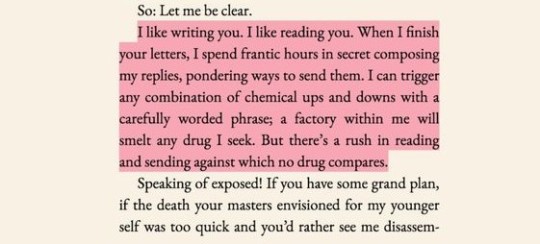
Right now I'm reading The Long Way to a Small, Angry Planet, and it is fascinating. I love a good scifi book, especially a scifi book that really takes into consideration the vastness of space and how varied other species and planets could be. Also punching holes through subspace sounds like a pure adrenaline trip and I'm deeply interested and captivated.
Anyway. Thesis is not progressing, deadline is getting closer. I should stop reading and start writing at some point. Meh. Stress levels are still not optimal. Stars aren't aligned. Need more adrenaline.
#rapha talks#rapha reads#books#book recs#literature#sf literature#scifi#this is how you lose the time war#the long way to a small angry planet#i know i'm the one who came up with my thesis subject. i know i'm the one who choose to go back and get another master's degree.#but still. why the hell did i do that. this thesis is killing me.#or maybe not the thesis itself but the stress of writing it coupled with the intense family drama i have to deal with at the same time#adding to that the fact that i don't have a job lined up next yet + won't have a flat after the 31st and need to get my stuff back#... i can't focus at the same time on my thesis my dad going through it my mom and her dumbass decisions and my future situation#it's just too much. so instead i read. reading has never failed me. reading is the most faithful companion of my existence#if i couldn't read anymore i don't know what or who i'd be#i need somebody to find me a flat and a job and someone else to deal with my parents while i finish this thesis#sadly no one is jumping on the tasks and i'm left with too much noise in my head
33 notes
·
View notes
Text
How High We Go In The Dark seems, 90 pages in, to be best understood as a broadly pandemic-themed set of Twilight Zone episodes.
I just finished the chapter about forming a giant human pyramid in purgatory to throw a baby high enough that it floats back into the world, and started the one where growing human organs for transplant in pigs has resulted in one capable of speech.
Also one of the most emotionally heavy books I've read all year.
27 notes
·
View notes
Text
AUTHOR EXTRAORDINAIRE

'My own conscious ideal has been to delude the reader into accepting an impossibility, or series of impossibilities, by means of a sort of verbal black magic, in the achievement of which I make use of prose-rhythm, metaphor, simile, tone-color, counter-point, and other stylistic resources, like a sort of incantation.'

Author Extraordinaire Clark Ashton Smith
#clark ashton smith#author extraordinaire#sf#horror#fantasy#writblr#writing inspiration#books#literature#pulp
12 notes
·
View notes
Text
Queer Fiction Free-for-All Book Bracket Tournament: Preliminary Round


Book summaries and submitted endorsements below:
The Mammoth Book of SF Stories by Women, edited by Alex Dally MacFarlane
Endorsement from submitter: "This is a collection of several dozen short stories, some of which are queer. Includes a F/F story by Ursula Le Guin!"
33 outstanding science fiction stories by women
Travel by train to the Moon, discover living spaceships born in gas giants and explore the constellations, alternate universes and post-apocalyptic worlds of this compelling collection of SF written by women.
Whether crossing the stars or constructing the future of our planet, women have always written powerful, important science fiction. This anthology showcases the most exceptional SF stories written by women in recent decades, from classic stars Ursula K. Le Guin and Angélica Gorodischer; science fiction greats Karen Joy Fowler and Nancy Kress; new award-winning talents Elizabeth Bear, Nnedi Okorafor and Aliette de Bodard; and many more.
Short story collection, anthology, science fiction, speculative fiction, experimental, adult
Changelings: An Autistic Trans Anthology, edited by Ryan Vale and Ocean Riley
Nothing about us without us!
A young adult anthology of stories about trans autistic characters by trans autistic authors. These last few years have been difficult for the transgender community. This has included frequent attacks on autistic trans people, claiming we can’t possibly understand who we are or what we want. This book focuses on autistic trans masc and non-binary people telling our own stories. It aims to explore autistic trans joy and challenges and to show all the autistic trans people out there that they are not alone.
A young shepherd gets a glimpse of what could have been, but all is not as it seems.
A babysitter is tasked to take care of an unusual child, and discovers who they are in the process.
In a dystopian future, a teenager discovers a supposedly extinct animal on a beach.
Featuring stories from 13 authors including a story from New York Times bestselling author Andrew Joseph White.
Short story collection, anthology, science fiction, fantasy, contemporary, young adult
#polls#queer fiction free for all#the mammoth book of sf stories by women#alex dally macfarlane#ursula le guin#ursula k. le guin#ursula k le guin#changelings#changelings an autistic trans anthology#ryan vale#ocean riley#andrew joseph white#books#fiction#booklr#lgbtqia#tumblr polls#bookblr#book#lgbt books#queer books#poll#queer fiction#fiction books#book polls#queer lit#queer literature
15 notes
·
View notes
Text

Y he kinda bad tho
#lol#lmao#art#artwork#digital art#ibispaintx#ibispaint art#gay#ddlc monika#ddlc fanart#ddlc#smiling friends charlie#smiling friends#doki doki literature club#doki doki monika#sf charlie#idk what else to tag#perchance#you cant just say perchance#flamepinion#silly
16 notes
·
View notes
Text
youtube
7.2: Ariel & Christina Discuss: Why Must Utopia Be Cruel?
In this episode, Ariel and Christina try to get to the bottom of why our fictional visions of utopia are so negative. They often involve mindless acquiescence to an authoritarian nanny state, the oppression and labor of an underclass, or both. It’s as if we can’t imagine a situation in which we all voluntarily treat each other (reasonably) decently and life can be good for everyone. We discuss the literary origins of utopia, how it has evolved (or not) as a concept, and Ariel gives a few examples of sci-fi futures that are about as close to her style of solarpunk utopia as can be. Ultimately, the topic of utopia raises more questions than answers!
Links:
Original blog on the concept of a protopia: https://kk.org/thetechnium/protopia/
Audio dramatization of "Kitaskinaw 2350": https://www.cbc.ca/listen/cbc-podcasts/1020-this-place/episode/15862270-kitaskinaw-2350
"This Place" publisher's page: https://www.portageandmainpress.com/Books/T/This-Place
Episode 6.10: the Dilemma of Utopian Joy: https://www.youtube.com/watch?v=saBnIh3jZq4
#solarpunk#Solarpunk Presents Podcast#podcast#podcasting#Utopian literature#utopia#Sir Thomas More#Saint Thomas More#the ones who walk away from omelas#optimism vs pessimism#literary history#science fiction#indigenous futurism#afrofuturism#utopian statecraft#SF#Studio Ghibli#utopian aesthetic#Wakanda#Tlalokan#Black Panther#Black Panther II: Wakanda Forever#Youtube
7 notes
·
View notes
Photo


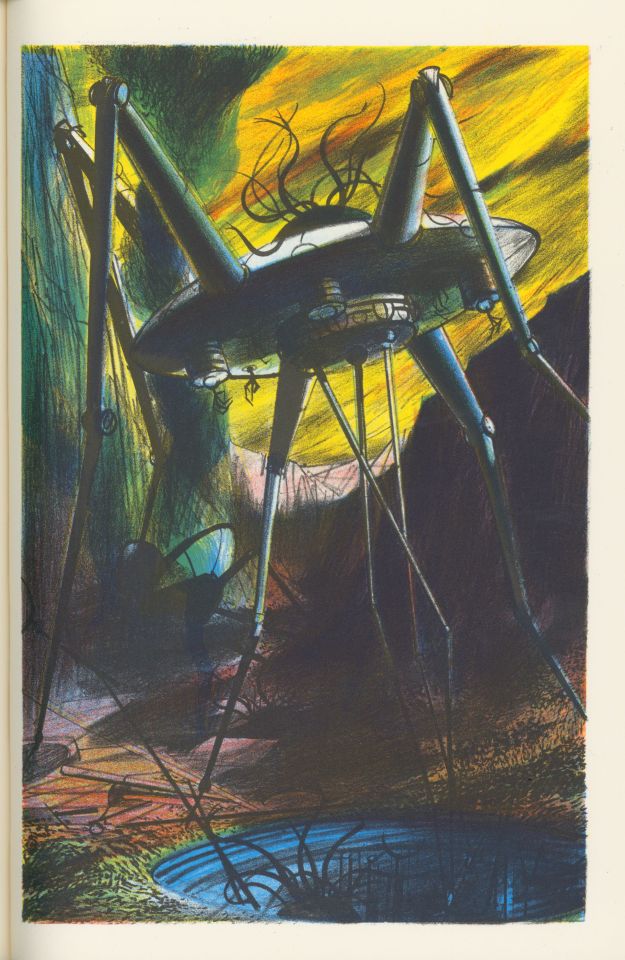
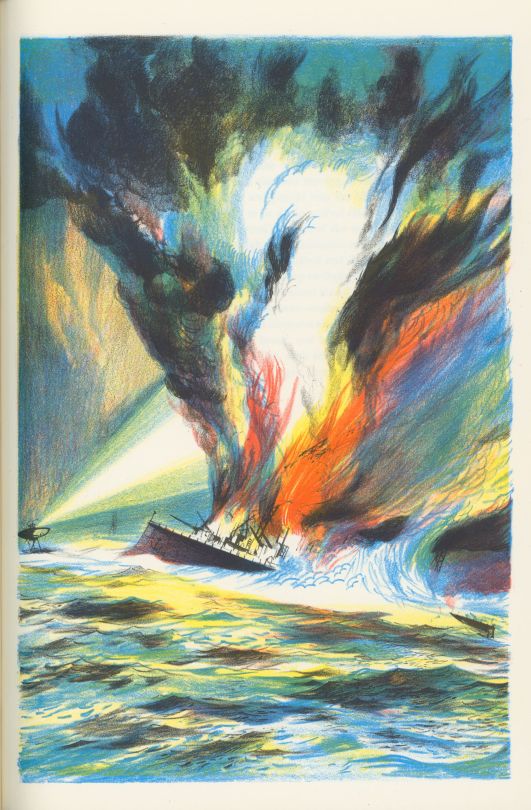
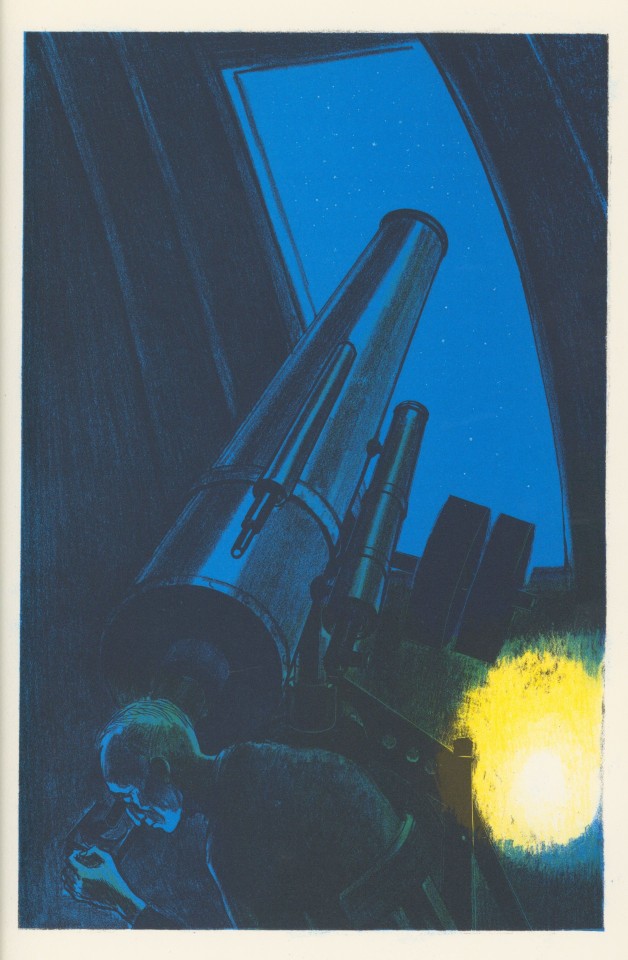
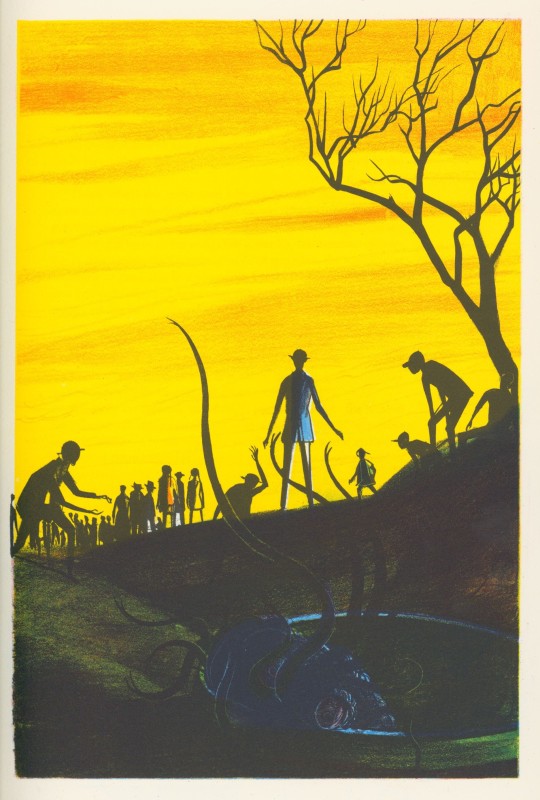

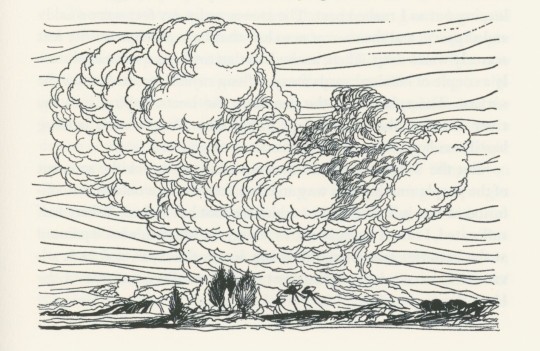
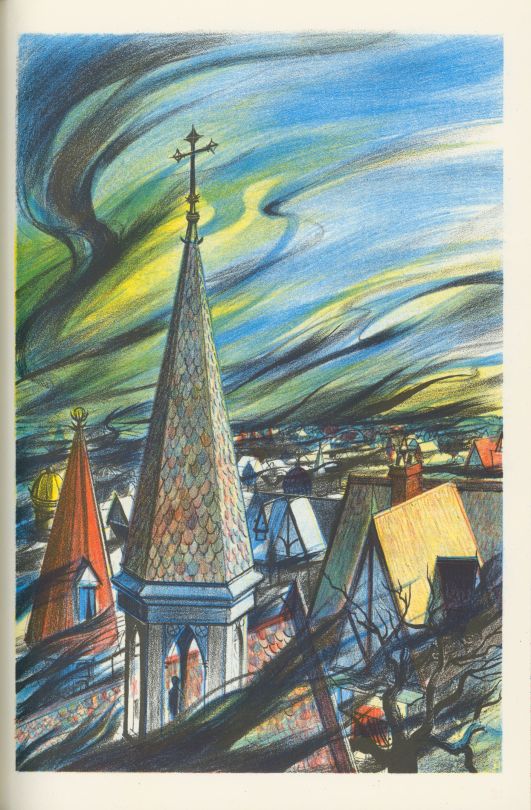
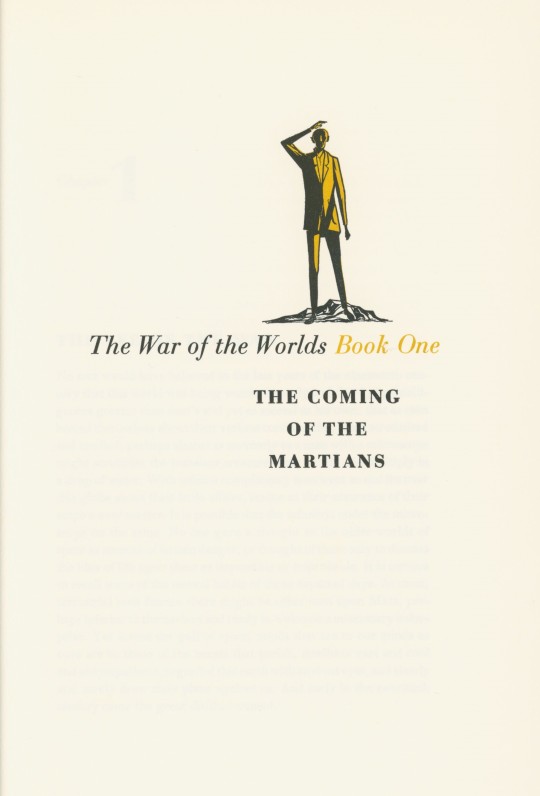
Staff Pick of the Week
First serialized in Pearson’s (UK) and Cosmopolitan (US) in 1897, H.G. Wells’s War of the Worlds wasn’t the very first alien story ever told, but it is probably the most enduring and culturally significant of those early tales. Wells wasn’t just drawing on the nascent genre of science fiction but also the (earthly) invasion literature that was first popularized by George Tomkyns Chesney’s The Battle of Dorking ( Blackwood's Magazine, 1871). Wells later wrote that War of the Worlds was inspired by the genocidal treatment of Aboriginal Tasmanians by British colonizers.
The Limited Edition’s Club edition of H.G. Well’s War of the Worlds was published in 1964. It is illustrated with ten color lithographs, drawn directly on the plates by Joeseph Mugnaini, as well as a number of smaller line drawings by the artist. We posted a few years ago about the Limited Editions Club edition of The Time Machine, also illustrated by Mugnaini. These two books were originally issued together in an ochre-yellow slipcase that matches the end papers; the linen-weave book-cloth bindings are dyed in an opposite color scheme (black with a red spine label for The Time Machine and red with a black spine label for War of the Worlds). The boxed set was designed by Peter Oldenburg and printed on white wove paper from Curtis Paper Company by Abraham Colish at his press in Mt. Vernon, NY. The lithographs were pulled by master printer George C. Miller.
I love how Mugnaini’s colorful illustrations manifest a sense of unease: the yellow and red skies backing the alien invaders, the extreme heat of blue streaked flames, the kaleidoscopic ruins of a building. Mugnaini was best known for his many collaborations with another Science Fiction heavyweight: Ray Bradbury, including cover art for the first paperback and hardback editions of Fahrenheit 451. A previous Staff Pick featured Mugnaini’s illustrations for the Limited Editions Club of Bradbury’s The Martian Chronicles.
You can find more posts on the work of H. G. Wells here.
Check out more from illustrator Joe Mugnaini here.
And here you can find more from Limited Editions Club.
For more Staff Picks here.
-Olivia, Special Collections Graduate Intern
#Staff Pick of the Week#The War of the Worlds#H. G. Wells#Joe Mugnaini#Joseph Mugnaini#Limited Editions Club#Fine Press Books#Fine Press#Invasion Literature#SF#SFF#Science Fiction#Ray Bradbury#lithographs#color lithographs#color lithography#Peter Oldenburg#Curtis Paper Company#Curtis Paper Mill#Abraham Colish#Press of A. Colish#olivia
94 notes
·
View notes
Text

Blade Runner : Philip K. Dick : Free Download, Borrow, and Streaming : Internet Archive
22 notes
·
View notes
Text
𝗥𝗲𝘃𝗶𝗲𝘄: "𝗧𝗵𝗲 𝗖𝗿𝗲𝗮𝘁𝘂𝗿𝗲𝘀 𝗧𝗵𝗮𝘁 𝗧𝗶𝗺𝗲 𝗙𝗼𝗿𝗴𝗼𝘁" 𝗯𝘆 𝗥𝗮𝘆 𝗕𝗿𝗮𝗱𝗯𝘂𝗿𝘆 -
Bradbury's novella is philosophy and pulp, silly and lyrical, therefore slipping the thoughtful into the story's fun.
#literature#bookworm#read read read#books#book reviews#ray bradbury#the creatures that time forgot#novella#science fiction#sf#parable
2 notes
·
View notes
Text
youtube
PARLONS SPACE-OPERA : The Wayfarers Saga, Becky Chambers - HUGO AWARDS 2019 (sans spoilers)
Salut à toi qui a sans doute aussi la tête dans les ��toiles.
Petit retour sur la saga Wayfarers de Becky Chambers garanti sans spoilers !
- The Long Way to a Small, Angry Planet. - A Closed and Common Orbit. - Record of a Spaceborn Few. - The Galaxy, and the Ground Within.
Bon voyage !
#space opera#the wayfarers saga#the long way to a small angry planet#becky chambers#youtube#video essay#book review#en français#french side of tumblr#whatthefrance#science fiction#sf#scifi#scifi literature#sf literature#sf books#book recommendations#book recs#sans spoilers#no spoilers#une petite view un petit like pour mon frère siouplaît ? merci bien !#rapha talks#oui c'est mon frère ça - il est cool je vous jure#Youtube
1 note
·
View note
Text
AUTHOR EXTRAORDINAIRE

'Science fiction, outside of poetry, is the only literary field which has no limits, no parameters whatsoever. You can go not only into the future, but into that wonderful place called other, which is simply another universe, another planet, another species.'

'When you combine something to say with the skill to say it properly, then you’ve got a good writer.'

'Writing is a communication.'

'I write a story as if it were a letter to someone and essentially, that's what you do.'

'You don't sit up in a cave and write the Great American Novel and know it is utterly superb, and then throw it page by page into the fire. You just don't do that. You send it out. You have to send it out.'

Author Extraordinaire Theodore Sturgeon
11 notes
·
View notes
Text
Mass Effect really has like a unique winning combination imo the hard and soft sci fi together it's like a sci fi creme brulee or somethng. When the sci fi has sexable aliens AND lagrange points. The dialectics of it all
3 notes
·
View notes
Text
Leigh Brackett's pulp SF stories are full of stuff like "hero & heroine flirt by giving each other facial scars" and planets whose dress code is "tits out always"
She also wrote the first draft of Empire Strikes Back.
imagine if Star Wars was allowed to be that horny. the hotness would make people's heads explode.
#star wars#leigh brackett#the empire strikes back#esb#empire strikes back#tesb#literature#science fiction#pulp sf#movies#film
2 notes
·
View notes
Text
Nobody understands Professor Venomous like I do...
#''Laserblast never loved Carol''; ''PV making a deal with SF is OOC''; ''Laserblast never liked women''#my god. they rlly didn't pay attention during their literature classes... they don't understand what Carol represents in KO's and LB story#im writing a thing about this but#Carol represents groundedness confidence and hark work#she is meant to be the rock LB and KO can lean on for support#The reason why LB doesn't listen to Carol is because he believes he can take a shortcut to greatness.#ok ko is a story about how there are no shortcuts to greatness - it requires hardwork. LB can't come to terms with that#which is why he took the shortcut SF gave him... its like... its not abt how much LB loves Carol vs Boxman...
6 notes
·
View notes
Text
if anything is my "5:10 am..... back to denouncing anglicans" it's people talking about high-low cultural divides as though it's remained stable across time and space
#the sf-literature war is over. science fiction won because it's goal was merely to prove its potential legitimacy as art#which is a more achievable goal than trying to prove only literature is real art ackshually
2 notes
·
View notes